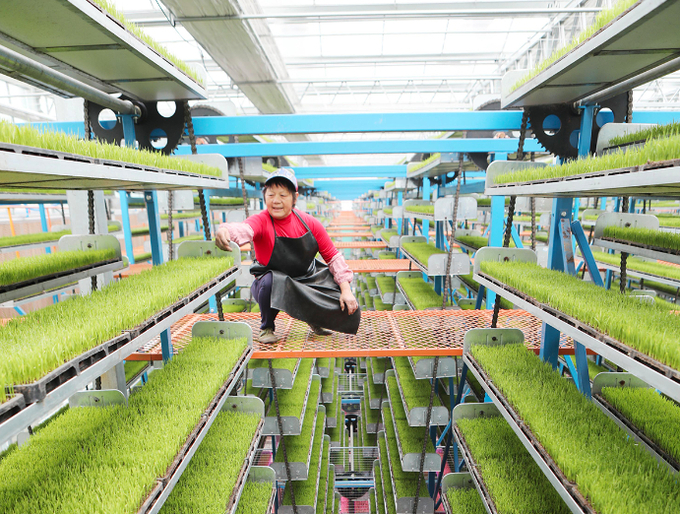June 17, 2025 | 19:28 GMT +7
June 17, 2025 | 19:28 GMT +7
Hotline: 0913.378.918
June 17, 2025 | 19:28 GMT +7
Hotline: 0913.378.918

A worker check the growth of seedlings at the intelligent seedling cultivation base in Shuangxing village, Xianlong town, Yongchuan district, Southwest China's Chongqing Municipality, on March 14, 2024. Photo: VCG.
The contribution rate of China's agricultural science and technology progress reached 63.2 percent in 2023, roughly 10 percentage points higher than that of 2012, amid efforts to enhance sci-tech self-reliance in the sector, an official with China's Ministry of Agriculture and Rural Affairs said.
The ratio was 62.4 percent in 2022.In the first half of this year, the ministry and 16 central government departments and agencies have identified a total of 401 tasks for scientific and technological breakthroughs and will publish the list soon, Zhang Xingwang, a vice minister of agriculture and rural affairs, said at a press conference in Beijing.
The list is aimed at better channeling scientific and research resources to sectors that are weak links and desperately need improvement, such as cultivating high-production, high-yield soybean breeds and development of smart and intelligent agricultural machineries, according to the official.
Aided by increased contributions from agricultural machinery and technology, China secured a total summer grain harvest of 149.78 million tons this year, up 2.5 percent or nearly 3.63 million tons year-on-year, the largest increase in nine years, according to the ministry.
Summer grain output per hectare continued to improve with efforts focused on improving corn, wheat and soybean yields.
The self-sufficiency rate for soybeans in China has increased by nearly 4 percentage points in the past several years, ministry officials said.
Experts said that the key to development of China's agricultural sector lies in harnessing the power of science and technology, given the country's large population and limited arable land.
The utilization of digital technologies, such as the use of drones and the Internet of Things tackles the lack of labor and pushes China's food security to a new height.
(Global Times)

(VAN) Extensive licensing requirements raise concerns about intellectual property theft.

(VAN) As of Friday, a salmonella outbreak linked to a California egg producer had sickened at least 79 people. Of the infected people, 21 hospitalizations were reported, U.S. health officials said.

(VAN) With the war ongoing, many Ukrainian farmers and rural farming families face limited access to their land due to mines and lack the financial resources to purchase needed agricultural inputs.

(VAN) Vikas Rambal has quietly built a $5 billion business empire in manufacturing, property and solar, and catapulted onto the Rich List.

(VAN) Available cropland now at less than five percent, according to latest geospatial assessment from FAO and UNOSAT.

(VAN) Alt Carbon has raised $12 million in a seed round as it plans to scale its carbon dioxide removal work in the South Asian nation.

(VAN) Attempts to bring down the price of the Japanese staple have had little effect amid a cost-of-living crisis.